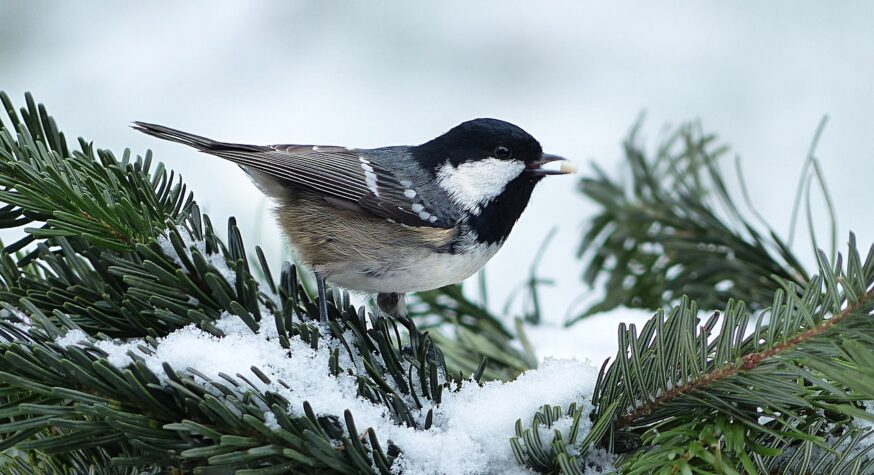As the leaves begin to fall and a chill creeps into the air, commercial landscaping customers and government facility property managers in the Mid-Atlantic region are gearing up for winter. Preparing your commercial lawns and landscaping for the winter months is not only essential for the aesthetics of your property but also for the health and longevity of your outdoor spaces. In this comprehensive guide tailored to the Maryland, Virginia, Delaware, and greater Washington D.C. area, we’ll walk you through the crucial steps of fall clean-up and winter preparation. By following these guidelines, you’ll ensure that your commercial landscapes remain vibrant and welcoming even during the harshest Mid-Atlantic winters.
1. The Importance of Fall Clean-Up
Before diving into winter preparation, a thorough fall clean-up is in order. It sets the stage for a successful winterization process and ensures that your landscape emerges from winter in top condition. Here are the key components of fall clean-up:
A. Leaf Removal
Falling leaves are an iconic part of autumn, but when left unattended, they can smother your lawn and landscaping. A thick layer of leaves prevents sunlight, air, and moisture from reaching the grass and plants, potentially leading to fungal diseases and a weakened turf. Regularly remove fallen leaves using rakes, leaf blowers, or specialized lawn vacuums. Composting the leaves or using them as mulch in garden beds can also be an eco-friendly option.
B. Pruning and Trimming
Late fall is an excellent time to prune trees and shrubs in your commercial landscaping. Remove dead or damaged branches to prevent them from falling during winter storms. Proper pruning also promotes healthy growth in the spring.
C. Lawn Aeration
Aeration involves perforating the soil with small holes to allow air, water, and nutrients to penetrate deep into the root zone. It’s especially important in the Mid-Atlantic region, where compacted soil is common. Aerating in the fall enhances root development and overall lawn health.
D. Fertilization and Seeding
Late fall is an ideal time to fertilize your lawn. This provides essential nutrients that will be absorbed during the winter months, strengthening the grass. Additionally, overseeding thin or bare areas helps thicken the lawn and prevent weed growth.
E. Mulching
Applying a layer of mulch to garden beds helps insulate plant roots, regulate soil temperature, and retain moisture. Mulch also suppresses weed growth, reducing the need for maintenance during the winter.
2. Protecting Plants and Shrubs
The Mid-Atlantic’s unpredictable winter weather can be tough on plants and shrubs. Here’s how to shield them from the elements:
A. Mulching Around Plants
In addition to mulching garden beds, consider adding a layer of mulch around the base of trees and shrubs. This provides insulation and prevents soil heaving caused by freeze-thaw cycles.
B. Wrapping Vulnerable Plants
Delicate or young trees and shrubs may benefit from protective wraps. These wraps shield against harsh winds and frost damage. Be sure to remove them in the spring to avoid mold and pest infestations.
C. Watering Before Freeze
Proper hydration is crucial for plants during winter. Ensure they receive adequate water before the first freeze. However, avoid overwatering, as excess moisture can lead to root rot in cold, soggy soil.
3. Lawn Equipment and Irrigation Systems
Your commercial landscaping equipment and irrigation system require attention to survive the winter intact:
A. Equipment Maintenance
Clean and store landscaping equipment properly. Drain fuel from lawnmowers and other gas-powered tools to prevent fuel degradation. Store equipment in a dry, protected area to shield it from the elements.
B. Irrigation System Winterization
To prevent costly damage to your irrigation system, schedule a professional winterization service. This involves blowing out water from the lines to prevent freezing, which can lead to burst pipes and damaged components.
4. Snow and Ice Management Plans
In the Mid-Atlantic region, winter brings snow and ice, necessitating a proactive snow and ice management plan. Commercial properties must prioritize safety and accessibility during winter storms. Here are key components of an effective plan:
A. Snow Removal
Contract with a reliable snow removal service well in advance of winter. Ensure they have the equipment and resources to promptly clear snow from parking lots, walkways, and entrances. It’s best to get quotes early so snow contractors have time to visit your site, estimate which equipment will be needed and formulate a detailed snow removal plan. Rasevic can help – contact us today!
B. Ice Management
Ice melt products are essential for preventing slips and falls. Choose environmentally friendly options when applicable, and ensure they are applied correctly to avoid damage to plants and hardscaping. It’s best to utilize a professional snow and ice management company for the application of ice melt products to be sure the correct amount is used and the right products based on the temperatures. If too much ice melt is used, it will damage nearby plants and the environment. It’s also hard on concrete and metals.
C. Emergency Response
Have a clear protocol for responding to severe winter weather. This includes designating responsible personnel, establishing communication channels, and maintaining an emergency supply of essentials like salt and shovels.
5. Planning for Spring
Lastly, use the winter season as an opportunity to plan for spring. Consider any desired landscaping improvements, planting schedules, or maintenance projects. Advance planning ensures a smooth transition into the growing season.
Conclusion: Winter Readiness Equals Year-Round Success
Preparing your commercial lawns and landscaping for winter in the Mid-Atlantic region is a multi-faceted endeavor. By embracing fall clean-up practices, protecting plants, maintaining equipment and irrigation systems, implementing snow and ice management plans, and planning for spring, you’re not only safeguarding your investment but also ensuring that your outdoor spaces remain inviting and attractive year-round. As the cold season approaches, remember that a well-prepared landscape can weather the winter’s challenges and emerge in the spring with renewed vitality, making a positive impression on clients, tenants, and visitors.
Looking for a quote? Contact our team at Rasevic today!
Request Quote
"*" indicates required fields

